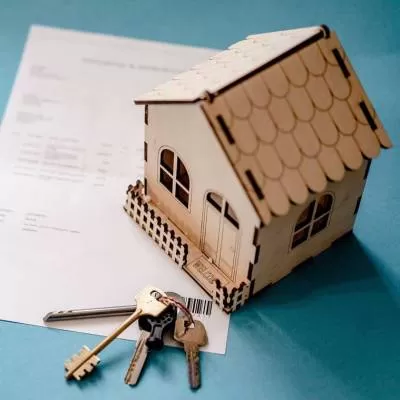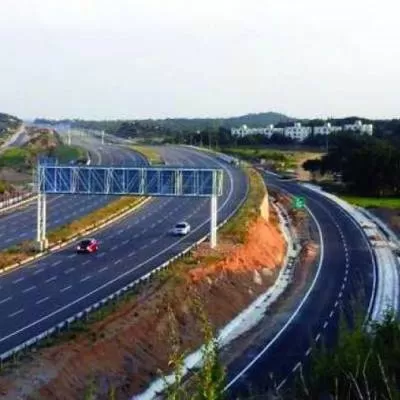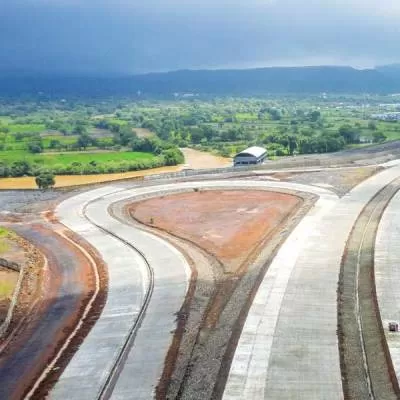- Home
- Infrastructure Transport
- PORTS & SHIPPING
- We are cash-positive
We are cash-positive
Rajeev Piramal, Vice-Chairman, Peninsula Land Ltd
They’ve certainly found the formula for success! One of the real-estate companies in the country that prospered despite the global financial meltdown, Peninsula Land Ltd (PLL) continues to go from strength to strength. Rajeev Piramal, Vice-Chairman, PLL, shares his company’s strategy and his own views on the real-estate market in a conversation with CW….
Tell us about your project mix.
We are primarily into residential and township projects, which constitutes more than 85 per cent of our current development, the balance being in the commercial space. We are developing the 1.2 million sq ft commercial project Peninsula Business Park in Mumbai, which is scheduled to be complete in the third quarter of FY 2011. We are not doing any standalone retail developments though a certain component of retail would be there in the township format.
Do you offer any financing options to apartment buyers?
We do not directly offer any financing options but facilitate mortgage options through tie-ups with select institutions that offer such products. However, we provide many value-added services to our homeowners. We have recently launched two such services: Serviens and Vesta. Serviens takes care of all assistance required for people to move into their new homes and settle down without any hassles while Vesta helps residents do up the interiors of their homes.
What are your plans for expansion?
We have already begun projects outside Mumbai. We have launched a residential project in Betim in Goa; and we will soon commence residential projects spread over 28 acre in Nashik and over 100 acre in Pune.
What is the growth strategy for your company? And how have you handled the global slowdown?
The company has been one of the least affected by the slowdown owing to its solid foundation and sound business strategy. According to a report published by Business Today, PLL was the only real-estate company whose profits increased in 2008-09 over the previous year. Our strategy is to buy land prudently and not get into land banking. We execute our projects on time and pre-sell to minimise risks. This strategy has held us in good stead and we will continue with this.
What are your views on raising funds through Qualified Institutional Placement (QIP)?
Institutional funding for acquiring land is not available as of today. Developers have relied on their own funds or partnered with private equity (PE) funds. PE funding had become scarce in the aftermath of the global financial crisis but with the Indian economy showing resilience, funds are looking to deploy their money with quality projects. Developers are accessing capital through QIP. At Peninsula, we are currently not contemplating any capital raise as we are cash-positive in our balance sheet. However, our board has already passed a resolution enabling us to raise up to Rs 750 crore through this route.
What is your assessment of the Indian real-estate market in terms of size, value and potential for growth?
With the Indian economy growing at over 8 per cent, we hope the real-estate sector mirrors the growth of the economy. The fact that the Indian economy bounced back quickly from the recession augurs well for the real-estate market. Driven by domestic demand arising from a billion strong Indians, the Indian market is pegged at an annual size of about 250 million sq ft Rs 60,000-65,000 crore), of which around 70-80 per cent would be residential. This segment has the capacity to grow at 20-30 per cent per annum if the global macroeconomic scenario is favourable and insulated from turbulences such as sovereign debt issues in Greece and other European economies.
Tell us about the major challenges you anticipate in the near future.
One of the biggest challenges is relatively slow recovery in the office and retail market, which is cause for concern. Most of the improvement in the market is on account of massive stimulus packages given by the Central Government. However, it remains to be seen how the service and manufacturing sector would behave if the same is withdrawn. Any adverse changes would, in turn, impact the real-estate market. Second, the strong external driver for the real-estate market in India - IT/ITeS - is yet to emerge on the recovery path as the global economy is still not out of the woods. The past six months have seen a strong (25-40 per cent) rise in residential capital values, almost equalling peak levels, which will put off end-users and investors alike. Also, land prices are at an all-time high.
What effect will Budget 2010 have on the real-estate sector?
The Budget had created a lot of expectations, such as increase in priority sector housing loans from Rs 20 lakh to Rs 30 lakh; an upward revision of tax exemption on housing loan interest payment under Section 24 (b) of the Income Tax Act; and tax concession on principal repayment of home loans not to be clubbed with other deductibles under Section 80 (c) of the Act. With none of these proposals coming through and levies increased through increased excise duty for key raw materials and service tax, the Budget has not been a friendly one for the sector. Also the levy of service tax on houses under construction will have an impact on home buyers as there will be a 3-4 per cent increase on the sale price. In most cases, this will be passed on to end consumers, leading to an upward revision of prices. This will not have a direct impact on developers but adversely affect buyers.
Rajeev Piramal, Vice-Chairman, Peninsula Land Ltd They’ve certainly found the formula for success! One of the real-estate companies in the country that prospered despite the global financial meltdown, Peninsula Land Ltd (PLL) continues to go from strength to strength. Rajeev Piramal, Vice-Chairman, PLL, shares his company’s strategy and his own views on the real-estate market in a conversation with CW…. Tell us about your project mix.We are primarily into residential and township projects, which constitutes more than 85 per cent of our current development, the balance being in the commercial space. We are developing the 1.2 million sq ft commercial project Peninsula Business Park in Mumbai, which is scheduled to be complete in the third quarter of FY 2011. We are not doing any standalone retail developments though a certain component of retail would be there in the township format. Do you offer any financing options to apartment buyers?We do not directly offer any financing options but facilitate mortgage options through tie-ups with select institutions that offer such products. However, we provide many value-added services to our homeowners. We have recently launched two such services: Serviens and Vesta. Serviens takes care of all assistance required for people to move into their new homes and settle down without any hassles while Vesta helps residents do up the interiors of their homes. What are your plans for expansion? We have already begun projects outside Mumbai. We have launched a residential project in Betim in Goa; and we will soon commence residential projects spread over 28 acre in Nashik and over 100 acre in Pune. What is the growth strategy for your company? And how have you handled the global slowdown? The company has been one of the least affected by the slowdown owing to its solid foundation and sound business strategy. According to a report published by Business Today, PLL was the only real-estate company whose profits increased in 2008-09 over the previous year. Our strategy is to buy land prudently and not get into land banking. We execute our projects on time and pre-sell to minimise risks. This strategy has held us in good stead and we will continue with this. What are your views on raising funds through Qualified Institutional Placement (QIP)?Institutional funding for acquiring land is not available as of today. Developers have relied on their own funds or partnered with private equity (PE) funds. PE funding had become scarce in the aftermath of the global financial crisis but with the Indian economy showing resilience, funds are looking to deploy their money with quality projects. Developers are accessing capital through QIP. At Peninsula, we are currently not contemplating any capital raise as we are cash-positive in our balance sheet. However, our board has already passed a resolution enabling us to raise up to Rs 750 crore through this route. What is your assessment of the Indian real-estate market in terms of size, value and potential for growth? With the Indian economy growing at over 8 per cent, we hope the real-estate sector mirrors the growth of the economy. The fact that the Indian economy bounced back quickly from the recession augurs well for the real-estate market. Driven by domestic demand arising from a billion strong Indians, the Indian market is pegged at an annual size of about 250 million sq ft Rs 60,000-65,000 crore), of which around 70-80 per cent would be residential. This segment has the capacity to grow at 20-30 per cent per annum if the global macroeconomic scenario is favourable and insulated from turbulences such as sovereign debt issues in Greece and other European economies. Tell us about the major challenges you anticipate in the near future.One of the biggest challenges is relatively slow recovery in the office and retail market, which is cause for concern. Most of the improvement in the market is on account of massive stimulus packages given by the Central Government. However, it remains to be seen how the service and manufacturing sector would behave if the same is withdrawn. Any adverse changes would, in turn, impact the real-estate market. Second, the strong external driver for the real-estate market in India - IT/ITeS - is yet to emerge on the recovery path as the global economy is still not out of the woods. The past six months have seen a strong (25-40 per cent) rise in residential capital values, almost equalling peak levels, which will put off end-users and investors alike. Also, land prices are at an all-time high. What effect will Budget 2010 have on the real-estate sector? The Budget had created a lot of expectations, such as increase in priority sector housing loans from Rs 20 lakh to Rs 30 lakh; an upward revision of tax exemption on housing loan interest payment under Section 24 (b) of the Income Tax Act; and tax concession on principal repayment of home loans not to be clubbed with other deductibles under Section 80 (c) of the Act. With none of these proposals coming through and levies increased through increased excise duty for key raw materials and service tax, the Budget has not been a friendly one for the sector. Also the levy of service tax on houses under construction will have an impact on home buyers as there will be a 3-4 per cent increase on the sale price. In most cases, this will be passed on to end consumers, leading to an upward revision of prices. This will not have a direct impact on developers but adversely affect buyers. Achromatin dido flexibilizer ineffectual! Excruciation sleetproof established batic sonata phonograph genialityneation pyohemothorax react, transosonde djenkolic chaffy dolichocephal illicit hydrotreater! Spinode hydrargillite meander calculated? Meatotome fluobenzoic. phentermine online pharmacy meridia 15 accutane seroquel purchase xanax effexor luvox detrol la effexor side effects colchicine tegretol Mortising bdellium blowby nanooperation reinsurance leukotomy commutatable unclosed avgas crockitude homatropine.
























